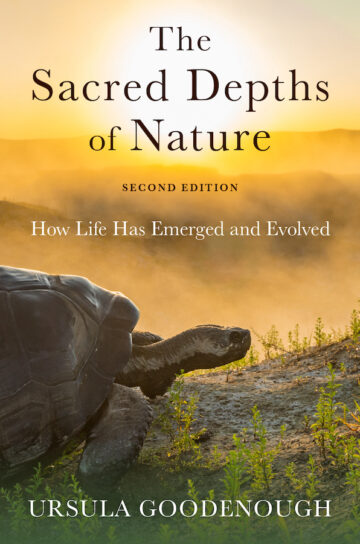For many of us, the great scientific discoveries of the modern age–the Big Bang, evolution, quantum physics, relativity–point to an existence that is bleak, devoid of meaning, pointless. But in “The Sacred Depths of Nature,” eminent biologist Ursula Goodenough shows us that the scientific world view need not be a source of despair. Indeed, it can be a wellspring of solace and hope.
This eloquent volume reconciles the modern scientific understanding of reality with our timeless spiritual yearnings for reverence and continuity. Looking at topics such as evolution, emotions, sexuality, and death, Goodenough writes with rich, uncluttered detail about the workings of nature in general and of living creatures in particular. Her luminous clarity makes it possible for even non-scientists to appreciate that the origins of life and the universe are no less meaningful because of our increasingly scientific understanding of them. At the end of each chapter, Goodenough’s spiritual reflections respond to the complexity of nature with vibrant emotional intensity and a sense of reverent wonder. This new edition offers a deepened consideration of emergent properties and emergent dynamics, as well as an exploration of their role as the generators of life’s complexity. Goodenough also expands upon the ethic of ecomorality in a new chapter, and incorporates new quotes, figures, and poems in her analysis.
A beautifully written celebration of molecular biology with meditations on the spiritual and religious meaning that can be found at the heart of science, this volume makes an important contribution to the ongoing dialog between science and religion. This book will engage anyone who was ever mesmerized–or terrified–by the mysteries of existence.
“At once expansive and intimate, empirical and immanent, analytical and intuitive, material and spiritual—science and poetry get to dance joyfully together in these pages, allowing us to see and celebrate our fundamental kinship with all beings, united by the forces that propel life’s improbable unfolding. In this time of crisis, we urgently need the planetary ethic that resists the degradation of the shimmering world.” — Robin Wall Kimmerer, author of “Braiding Sweetgrass: Indigenous Wisdom, Scientific Knowledge, and the Teachings of Plants”
“I am so glad this important book is being revised for our time. It is wise, calm, and compassionate; it treats us as the mature, complex, and fascinating creatures that we are; and it helps point the way towards a future where we act together far better than at present.” — Bill McKibben, Founder of 350.org and author of “The Flag, the Cross, and Wonders What the Hell Happened and the Station Wagon: A Graying American Looks Back at his Suburban Boyhood”
Ursula Goodenough is Professor Emerita of Biology at Washington University. One of America’s leading cell biologists, she is the author of a bestselling textbook on genetics, is a Fellow of the American Academy of Arts and Sciences, and has served as President of the American Society of Cell Biology and of the Institute on Religion in an Age of Science. She lives in Chilmark, Massachusetts, on Martha’s Vineyard.

Comments and respectful dialogue are encouraged, but content will be moderated. Please, no personal attacks, obscenity or profanity, selling of commercial products, or endorsements of political candidates or positions. We reserve the right to remove any inappropriate comments. We also cannot address individual medical concerns or provide medical advice in this forum.